|
|
|
Sort Order |
|
|
|
Items / Page
|
|
|
|
|
|
|
| Srl | Item |
| 1 |
ID:
101414


|
|
|
|
|
| Publication |
2011.
|
| Summary/Abstract |
This study examines the time series behaviour of oil production for OPEC member countries within a fractional integration modelling framework recognizing the potential for structural breaks and outliers. The analysis is undertaken using monthly data from January 1973 to October 2008 for 13 OPEC member countries. The results indicate there is mean reverting persistence in oil production with breaks identified in 10 out of the 13 countries examined. Thus, shocks affecting the structure of OPEC oil production will have persistent effects in the long run for all countries, and in some cases the effects are expected to be permanent.
|
|
|
|
|
|
|
|
|
|
|
|
|
|
|
|
| 2 |
ID:
137680


|
|
|
|
|
| Summary/Abstract |
This study evaluates scenarios for the oil production in Peru applying a Hubbert model. Two scenarios for the estimated ultimate recovery (EUR) were proposed: the first, in which low investments in E&P and social and environmental barriers undermine the development of oil resources beyond the limits characterized as 2P; the second, more optimistic, in which current exploratory and production areas in Amazonia and low-explored Offshore-Shelf basins are developed, thus, increasing EUR to 3P reserves plus contingent resources. Findings show that oil production in Peru has not followed a Single-Hubbert pattern, except for the area with more drilling activity and the highest accumulated production in the Northwest coast. Actually, institutional and regulation changes and less-attractive periods for operators due to poor results in oil discoveries explain why a multi-Hubbert approach better depicted the oil production in Peru. Peru has the potential to achieve a second peak of 274 kbpd of crude oil, overcoming the peak of 195 kbpd, reached in 1982. However, most of the remaining production would be located in Amazonia, where social and environmental issues pose critical challenges.
|
|
|
|
|
|
|
|
|
|
|
|
|
|
|
|
| 3 |
ID:
082336
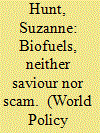

|
|
|
| 4 |
ID:
126817


|
|
|
|
|
| Publication |
2014.
|
| Summary/Abstract |
Bottom-up models of oil production are continuously being used to guide investments and policymaking. Compared to simpler top-down models, bottom-up models have a number of advantages due to their modularity, flexibility and concreteness. The purposes of this paper is to identify the crucial modeling challenges, compare the different ways in which nine existing models handle them, assess the appropriateness of these models, and point to possibilities of further development. The conclusions are that the high level of detail in bottom-up models is of questionable value for predictive accuracy, but of great value for identifying areas of uncertainty and new research questions. There is a potential for improved qualitative insights through systematic sensitivity analysis. This potential is at present largely unrealized.
|
|
|
|
|
|
|
|
|
|
|
|
|
|
|
|
| 5 |
ID:
149749


|
|
|
|
|
| Summary/Abstract |
Following the constitutional court's confirmation of the presidential result, Martin Roberts examines the international reaction and implications for Gabon's stability.
|
|
|
|
|
|
|
|
|
|
|
|
|
|
|
|
| 6 |
ID:
125629


|
|
|
|
|
| Publication |
2013.
|
| Summary/Abstract |
Industrial action, organised attacks, and the fighting among the armed groups the government relies on for security have severely reduced Libya's oil production. Richard Cochrane assesses the near term effects of these recurrent problems.
|
|
|
|
|
|
|
|
|
|
|
|
|
|
|
|
| 7 |
ID:
090527
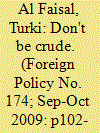

|
|
|
|
|
| Publication |
2009.
|
| Summary/Abstract |
Saudi Arabia holds about 25 percent of the world's proven oil reserves, is by far the largest exporter of oil, and maintains the largest spare production capacity in the world. US oil production started to decline in 1970, while US energy needs have skyrocketed since that time, and the United States is now the world's largest oil consumer.
|
|
|
|
|
|
|
|
|
|
|
|
|
|
|
|
| 8 |
ID:
120175


|
|
|
|
|
| Publication |
2013.
|
| Summary/Abstract |
Plentiful spare capacity persists in the oil production and tanker industries, contrary to Michael Levi's contention in his response to our earlier article, "Protecting 'The Prize.' " OPEC leaders retain excess capacity to minimize cartel members' cheating, and tanker companies retain considerable flexibility that allows them to adapt to political-military and other fluctuations in the market. Oil supplies are not on a knife-edge; exaggerated claims of energy vulnerability distort U.S. national security policy.
|
|
|
|
|
|
|
|
|
|
|
|
|
|
|
|
| 9 |
ID:
108764
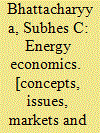

|
|
|
|
|
| Publication |
Verlag, Springer, 2011.
|
| Description |
xxvi, 721p.
|
| Standard Number |
9780857292674, hbk
|
|
|
|
|
|
|
|
|
|
|
|
Copies: C:1/I:0,R:0,Q:0
Circulation
| Accession# | Call# | Current Location | Status | Policy | Location |
| 056395 | 333.7/BHA 056395 | Main | On Shelf | General | |
|
|
|
|
| 10 |
ID:
128637
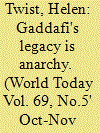

|
|
|
| 11 |
ID:
168692
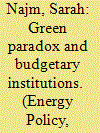

|
|
|
|
|
| Summary/Abstract |
We examine oil production strategies in response to the rise of alternative energy in context of Saudi Arabia and the United States. In a unified simultaneous equation model (SEM), over the period 1976–2015, we investigate the extent to which budget balance behaviour explains the nature of oil production strategies. We find that green regulations have a positive impact on U.S. oil production, while an inverse relationship holds for Saudi Arabia. We argue that the nature of budgetary institutions prevents Saudi Arabia from following a profit maximising behaviour. Saudi Arabia is incentivised to ensure political cohesion through adopting a procyclical fiscal policy. Rather, regulators seem incentivised to channel surplus towards individuals to gain popularity in the United States. A thriving shale oil industry is a plausible rationale for U.S. production strategies. Also known as a weak green paradox, this is problematic for climate change initiatives to reduce global emissions. Climate experts may wish to pay more attention to the supply-side of oil-markets when designing decarbonisation plans. The results challenge conventional wisdom of the green paradox neglecting the role of incentive structure between different types of oil producers.
|
|
|
|
|
|
|
|
|
|
|
|
|
|
|
|
| 12 |
ID:
081733
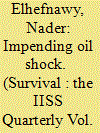

|
|
|
|
|
| Publication |
2008.
|
| Summary/Abstract |
The peak-oil theory asserts that oil production follows a bell-shaped curve, rising exponentially early on, hitting a peak and then declining terminally. As world oil production reaches its peak, energy importers will enjoy somewhat greater political weight; the economic balance of power among major industrial states will change according to their relative abilities to adapt to a scarcity of fossil fuels; and there will be increased risk of state failure, resource conflict and even nuclear-energy-related problems. These dangers might be minimised through national and international programmes designed to rapidly maximise energy efficiency and promote non-fossil-fuel energy sources
|
|
|
|
|
|
|
|
|
|
|
|
|
|
|
|
| 13 |
ID:
088210


|
|
|
|
|
| Publication |
2009.
|
| Summary/Abstract |
Peak oil research and the Association for the Study of Peak Oil and Gas (ASPO) have contributed a great deal to improve people's recognition of peak oil. Although peak oil is becoming a part of public recognition, it is still hard to say whether peak oil discussion will develop into a theory such as "peakoilism". On one hand, there are still some difficult problems in peak oil research. On the other hand, the peakoilers have the potential for scientific research and have their allies: the climate change researchers and the new energy advocates. Oil is a limited, non-renewable resource, and an oil peak is inevitable. Peak oil theory is a kind of development theory rather than a crisis theory, which promotes reasonable utilization of the limited oil resources, promotes conservation, and encourages the development of renewable energy.
|
|
|
|
|
|
|
|
|
|
|
|
|
|
|
|
| 14 |
ID:
090524
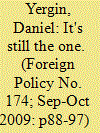

|
|
|
|
|
| Publication |
2009.
|
| Summary/Abstract |
Oil's very future is now being seriously questioned, debated, and challenged. The author of an acclaimed history explains why, just as we need more oil than ever, it is changing faster than we can keep up with.
|
|
|
|
|
|
|
|
|
|
|
|
|
|
|
|
| 15 |
ID:
057686
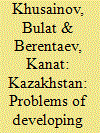

|
|
|
| 16 |
ID:
027745


|
|
|
|
|
| Publication |
London, George Allen and Unwin Ltd., 1972.
|
| Description |
232p.: mapshbk
|
| Standard Number |
0049530070
|
|
|
|
|
|
|
|
|
|
|
|
Copies: C:1/I:0,R:0,Q:0
Circulation
| Accession# | Call# | Current Location | Status | Policy | Location |
| 011172 | 953.67/WIN 011172 | Main | On Shelf | General | |
|
|
|
|
| 17 |
ID:
089944
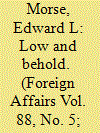

|
|
|
|
|
| Publication |
2009.
|
| Summary/Abstract |
Despite common assumptions, oil prices are likely to remain low for a while: key producers, especially Saudi Arabia, have been boosting their production, and demand growth in top consumers like the United States and China will be more modest than expected.
|
|
|
|
|
|
|
|
|
|
|
|
|
|
|
|
| 18 |
ID:
166299
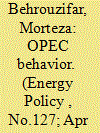

|
|
|
|
|
| Summary/Abstract |
OPEC procedures dictate that all member states should notify the volume of their crude oil reserves to the organization secretariat so that OPEC would reflect the figures in its official published materials. Many OPEC states say that it is not feasible to investigate the amount of their oil reserves through independent observers, believing this is a confidential issue. In fact, a contradiction appears to exist between the data for each oil field and the figures publicly announced for the fields on aggregate. This comes under the pretext of existing doubts about the volume of declared reserves.
|
|
|
|
|
|
|
|
|
|
|
|
|
|
|
|
| 19 |
ID:
083282
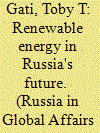

|
|
|
|
|
| Publication |
2008.
|
| Summary/Abstract |
If the focus of Russian political leadership continues to be on gas and oil production and if the state budget continues to rely heavily on tax revenues from these industries, there will be few incentives to innovate and develop new resources on a significant scale
|
|
|
|
|
|
|
|
|
|
|
|
|
|
|
|
| 20 |
ID:
061009
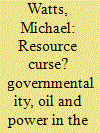

|
|
|
|
|
| Publication |
Spring 2004.
|
| Description |
p50-80
|
| Summary/Abstract |
What might it mean to say that resources, and resource-dependency, have consequences for the conduct of politics? This article explores the research conducted under the sign of resource politics associated with the work of Michael Ross, Paul Collier and others through a detailed examination of the political economy of oil in Nigeria. Much of the resource politics work suffers from either too strong a commodity-determinism or an insufficient attention to the ways in which specific resource characteristics matter analytically with respect to politics, rule and conflict. I approach the oil question in Nigeria by using the work of Michel Foucault and Nikolas Rose and by identifying three different forms of governable space and rule (the chieftainship, the ethnic minority, and the nation state) associated with oil-based capitalism. Governable spaces as forms of rule, identity and territoriality are not necessarily fully governable (they may be almost ungovernable and wracked by internal dissent and conflict) and may not be compatible among themselves, but rather work against one another in complex and contradictory ways.
|
|
|
|
|
|
|
|
|
|
|
|
|
|
|
|
|
|
|
|
|